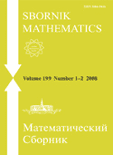
SBORNIK MATHEMATICS
metrics 2024
Advancing the Frontiers of Mathematical Knowledge
Introduction
SBORNIK MATHEMATICS is a distinguished journal dedicated to advancing research in the field of mathematics, particularly focusing on areas such as algebra and number theory. Published by the esteemed Steklov Mathematical Institute of the Russian Academy of Sciences, this journal has been a prominent platform for scholarly communication since its inception in 1993 and continues to thrive with contributions of significant relevance through 2024. The journal maintains a Q2 ranking in both the algebra and number theory category as well as in miscellaneous mathematics, highlighting its competitive standing in the mathematical community. While it is not an open-access publication, it offers critical insights and innovative research that are vital for mathematicians, researchers, and students alike. With an ISSN of 1064-5616 and an E-ISSN of 1468-4802, SBORNIK MATHEMATICS serves as a crucial resource for anyone looking to deepen their understanding of contemporary mathematical developments.
Metrics 2024
 0.55
0.55 0.80
0.80 0.80
0.80 31
31Metrics History
Rank 2024
Scopus
IF (Web Of Science)
JCI (Web Of Science)
Quartile History
Similar Journals

CZECHOSLOVAK MATHEMATICAL JOURNAL
Bridging Concepts, Building KnowledgeCzechoslovak Mathematical Journal is a distinguished academic journal published by Springer Heidelberg, dedicated to advancing the field of mathematics through the dissemination of high-quality research. With an ISSN of 0011-4642 and E-ISSN 1572-9141, this journal has been a pivotal platform for mathematicians and researchers from around the globe since its inception. The journal holds a Q3 ranking in the field of Mathematics (miscellaneous), demonstrating its commitment to providing a forum for the latest mathematical theories and applications, particularly in general mathematics, as indicated by its Scopus rank of #285/399 and 28th percentile in the field. While currently not offering open access options, the journal continues to attract a wide readership by making its valuable content available through traditional subscription models. The Czechoslovak Mathematical Journal serves as an essential resource for researchers, professionals, and students aiming to stay informed about recent developments and breakthroughs in mathematics, with focus years converging from 1995 to 2024.

Bulletin of the Iranian Mathematical Society
Exploring the depths of mathematical knowledge for a brighter future.The Bulletin of the Iranian Mathematical Society, published by SPRINGER SINGAPORE PTE LTD, is a distinguished journal dedicated to advancing the field of mathematics. With an ISSN of 1017-060X and E-ISSN 1735-8515, this journal has established a valuable platform for researchers and scholars to disseminate their findings from 2008 to 2024. The journal is categorized in the Q2 tier of Mathematics (miscellaneous) for 2023, showcasing its importance and relevance in the mathematical community, ranked #169 out of 399 in General Mathematics with a 57th percentile standing in Scopus. While currently operating under a subscription model, it remains an essential resource for professionals and students seeking cutting-edge research and developments in various domains of mathematics. The Bulletin aims to bridge theoretical research and practical application, thereby enriching both academia and industry.

COLLOQUIUM MATHEMATICUM
Connecting diverse mathematical disciplines for a brighter future.COLLOQUIUM MATHEMATICUM, published by ARS POLONA-RUCH, serves as an essential platform for the dissemination of innovative research in the field of mathematics. With an ISSN of 0010-1354 and a dedicated E-ISSN of 1730-6302, this journal plays a crucial role in advancing mathematical knowledge and fostering collaboration within the academic community. Although it is categorized in the Q3 quartile for miscellaneous mathematics, its content consistently attracts a diverse readership, reflecting a wide array of mathematical disciplines. Spanning publication years from 2001 to 2009 and resuming from 2011 to the present, *COLLOQUIUM MATHEMATICUM* offers researchers, professionals, and students the unique opportunity to engage with groundbreaking concepts and methodologies. With its home base in Warsaw, Poland, this journal not only contributes to the regional mathematical landscape but also impacts the broader global community. While currently not adopting an open access model, the journal remains committed to quality research, evidenced by its Scopus ranking within the general mathematics category. Engage with *COLLOQUIUM MATHEMATICUM* to be at the forefront of mathematical exploration.
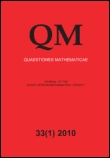
Quaestiones Mathematicae
Exploring the Depths of Mathematical InnovationQuaestiones Mathematicae is a distinguished academic journal dedicated to the field of mathematics, published by Taylor & Francis Ltd, a renowned name in scholarly publishing. Established in 1976, this journal has been a critical resource for researchers, professionals, and students alike, providing a platform for innovative and rigorous advancements in miscellaneous mathematics. The journal holds a 2023 Scopus rank of 35 out of 90 in its category, reflecting its significant contribution to the field with a 61st percentile standing, and whilst it is categorized in the Q3 quartile, it remains an essential avenue for sharing pivotal mathematical research. Although not open access, Quaestiones Mathematicae offers a rich archive of acclaimed papers, encouraging scholarly dialogue and fostering the growth of mathematical knowledge. With a converged span extending to 2024, it continues to evolve and adapt, ensuring its relevance and impact within the global academic community.
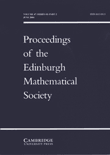
PROCEEDINGS OF THE EDINBURGH MATHEMATICAL SOCIETY
Charting new territories in mathematical thought.PROCEEDINGS OF THE EDINBURGH MATHEMATICAL SOCIETY, published by Cambridge University Press, stands as a cornerstone within the realm of mathematical research, providing a platform for original papers that push the boundaries of various mathematical disciplines. With a rich history dating back to 1883, this journal has evolved through several converged years, reflecting the dynamic nature of mathematical inquiry. As a Q2 category journal in the field of Mathematics (miscellaneous) according to the latest rankings, it situates itself within the upper tier of academic publications, offering an essential resource for researchers and professionals alike. While it currently does not offer open access options, the journal's contributions are invaluable, facilitating dialogue and collaboration among scholars. The journal's commitment to advancing mathematical knowledge makes it a vital publication for those engaged in the study and application of mathematical theories and principles.
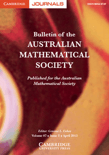
BULLETIN OF THE AUSTRALIAN MATHEMATICAL SOCIETY
Advancing Mathematical Frontiers Since 1969BULLETIN OF THE AUSTRALIAN MATHEMATICAL SOCIETY is an esteemed journal dedicated to advancing the field of mathematics, published by Cambridge University Press. Since its inception in 1969, this periodical has fostered scholarly communication and showcased pivotal research in various domains of mathematics, now projected to continue until 2024. With an impact factor that places it in the Q2 category of miscellaneous mathematics research, it holds a notable position among its peers, ranking 215th out of 399 in the Scopus database. Though it does not currently offer open access options, the journal remains a vital resource for researchers, professionals, and students seeking to deepen their understanding of mathematical advancements. The Bulletin serves as a crucial platform for disseminating original research, comprehensive reviews, and insightful perspectives that navigate the complexities of mathematics today, ensuring the community is well-informed and engaged.

Kyungpook Mathematical Journal
Exploring Innovative Applications in MathematicsWelcome to the Kyungpook Mathematical Journal, a prominent publication dedicated to the advancement of mathematical research across various fields, including applied mathematics and miscellaneous mathematical disciplines. Published by the Department of Mathematics at Kyungpook National University in South Korea, this journal aims to disseminate high-quality original articles, fostering a deeper understanding and innovative applications of mathematical theories. With a distinguished Scopus ranking in its category, standing at Q3 in Applied Mathematics and Q3 in Mathematics (miscellaneous), it serves as a crucial platform for both emerging and renowned scholars to share their findings with a global audience. This publication is indexed in reliable databases, ensuring enhanced visibility and impact for its contributors. Even though it currently lacks open-access distribution, the journal remains an essential resource for researchers, professionals, and students looking to stay at the forefront of mathematical exploration from 2007 to 2024 and beyond. Join us in contributing to the vibrant discourse that shapes the future of mathematics.
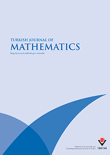
Turkish Journal of Mathematics
Exploring the Depths of Mathematical KnowledgeTurkish Journal of Mathematics is a prestigious academic publication dedicated to the advancement of mathematical research across a variety of subfields. Established in 1995 and published by the Tubitak Scientific & Technological Research Council Turkey, this journal has built a solid reputation, especially noted for its significant contributions to the field over the years, with its convergence spanning from 1995 to 2002 and again from 2006 to 2024. The journal, which holds a commendable Q2 ranking in Mathematics (miscellaneous) and is positioned in the 66th percentile of Scopus rankings for General Mathematics, aims to disseminate high-quality original research, reviews, and innovative methodologies to advance both theoretical and applied mathematics. Researchers, professionals, and students alike will find invaluable resources within its pages, providing insights that are pivotal for academic and practical applications in mathematics. Although it does not currently offer open access options, the journal remains an essential platform for those looking to engage with the forefront of mathematical inquiry.

Periodica Mathematica Hungarica
Connecting Researchers to the Heart of Mathematical Inquiry.Periodica Mathematica Hungarica is a prestigious academic journal published by Springer, focusing on the field of mathematics, with a particular emphasis on miscellaneous mathematical studies. Established in 1971, this journal has maintained its commitment to advancing mathematical research and its applications, making significant contributions over its converged years through 2024. With a Q2 ranking in the mathematics category as of 2023, it establishes itself as a vital resource within the mathematical community. Researchers and academics will find its inclusion in the Scopus database, ranking #189 out of 399 in general mathematics, indicative of its impact and relevance. Although it does not feature open access, the journal provides a wealth of high-quality peer-reviewed articles, thereby serving as an essential platform for the dissemination of innovative mathematical theories, methodologies, and findings. Engaging with the content of Periodica Mathematica Hungarica is crucial for anyone looking to stay at the forefront of mathematical research and development.
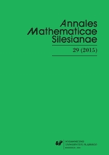
Annales Mathematicae Silesianae
Pioneering Insights in Diverse Mathematical DisciplinesAnnales Mathematicae Silesianae, an esteemed open-access journal published by SCIENDO, serves as a significant platform for the dissemination of research in the field of mathematics. With an ISSN of 0860-2107 and an E-ISSN of 2391-4238, the journal has been committed to the advancement of mathematical sciences since its inception, with a transition to open-access publishing in 2016. Situated in Poland, this journal aims to provide a forum for original research articles, review papers, and succinct communications across diverse mathematical disciplines. Despite its recent categorization in the Q4 quartile for miscellaneous mathematics and a Scopus ranking placing it in the bottom percentile, Annales Mathematicae Silesianae continues to encourage innovative studies and fresh perspectives that can contribute to the evolving landscape of mathematical research. Researchers, professionals, and students alike will find valuable insights within its pages as we look forward to the convergence of mathematical ideas until 2024.